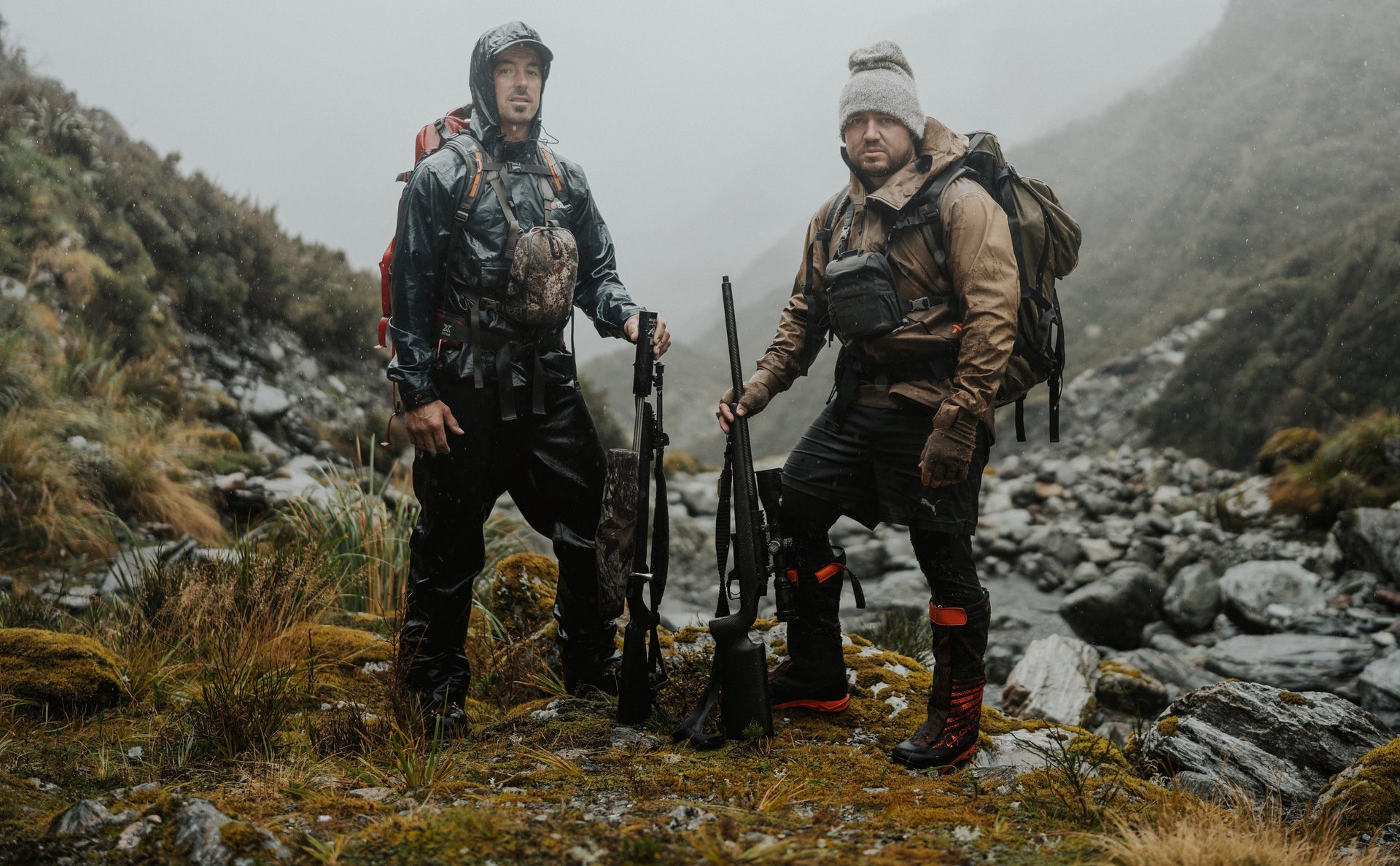
If there is one piece of kit that ends up on even the shortest of gear lists, a rain jacket should be it. Being just a small rock in the middle of the ocean, New Zealand’s weather can change very quickly, especially while hunting in alpine terrain. Hunters should carry waterproof gear on every trip, combined with a hat and gloves and a torch they are covered for a significant percentage of things that might go wrong on the hunting trip. The NZ Mountain Safety Council explains why waterproof gear is essential on any hunting trip.

Image @ First Lite
Modern rain jackets these days weigh around 700 grams for the more durable 3.5 or 4.5 layer fabrics, with the 2.5 layer “just incase” type jackets weighing as little as 300 grams, with modern high-quality membranes making for very lightweight and comfortable jackets.
For the hunter who tends to be harder on gear the 700 gram more durable option is actually still really light when you look at your equipment as a whole. For the serious gram counters doing those multi-day backpack missions, those super light jackets are great. Breathability matters a lot, or you will just end up soaking in your own sweat. Look for good pockets and pit zips to help venting as well as a good hood to help keep the warmth in. If you’re looking at water resistance and breathability ratings then make sure you are comparing apples with apples, as many companies will confuse consumers by cherry picking the rating of a particular layer in the fabric, yet when all 3.5 or 4.5 layers are tested as a unit, the results can be very different to just that single membrane layer.

One of these guys looks a whole bunch dryer than the other, image @Khan Adam @ Hamish Norten
If you plan to spend a lot of time on exposed ridgelines or on the mountain, quite simply rain pants are a must. While your mental picture of yourself may struggle with the fashion connotations, when it starts to get cold after dark or in high winds, they are a lifesaver. Think about what you will be doing if you have to wait out a swollen river or trying to help an injured mate when they can’t get to shelter. You need full length side zips so that you can get them on and off easily over your boots. They will weigh around 500 grams for those “just incase” type overtrou, or closer to 800 grams for the seriously durable rain pants that are designed to be able to walk in the wet all day.

Image @ First Lite
When it comes to choosing rain pants and jackets, like anything you get what you pay for. But pay attention to the weight vs the type of use you’re going to give it. The old PVC jackets and pants are simply not suitable, they don’t breathe, tear easily and are very heavy. And quite simply you will be soaking in your own sweet and freezing cold when you stop. If it weighs a lot, you may just decide that you won’t need it, so you won’t have it if the weather changes. Treat yourself to something that you like, and you can use it around town as well of course!
Speaking of that short packing list, let's cover the next item of rain protection. When it really goes pear-shaped some type of emergency shelter can mean the difference between inconvenience and being hypothermic, or worse. It could be a simple rain fly, emergency bag, bothy bag or bivvy bag. You need to have it on any trip where someone could get caught out injured and needs protection from the elements until help arrives. It should be appropriate and useful for the worse conditions possible where you’re going.

Image @ First Lite
By packing all these waterproof essentials, supporting the kit by packing a warm beanie and gloves means you’ll be warm, and dry. Wind chill and hypothermia are a real risk for hunters all year round in New Zealand’s extreme weather conditions. So when it comes to the essential waterproof layers, don’t skimp.
Check out the NZ Mountain Safety Council’s website on how to stay safe this Roar. Mountain Safety Council New Zealand — Big Game Hunting
Seven Roar hunting tips for staying safe
- Research the area and have a backup plan
- Check the weather and be prepared for it to change
- Pack a rain jacket and shelter just in case
- Tell a mate your plans before you go
- Check in with your mates regularly
- Take a map and keep track of your movements
- Watch your footing and take your time



